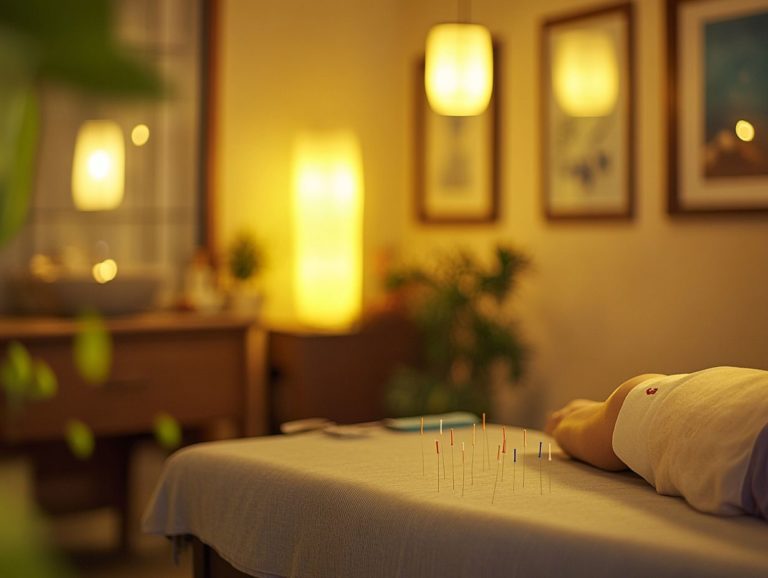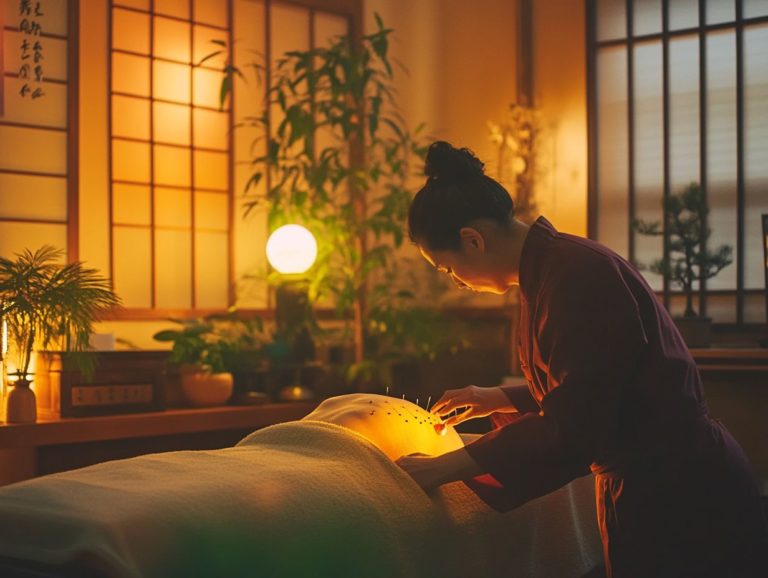5 Ways Acupuncture Can Improve Your Mood
Acupuncture transcends mere needles and pain relief; it embodies a holistic approach that can profoundly elevate your mood and enhance your overall well-being.
This practice works wonders by boosting endorphin release, balancing neurotransmitter levels, and alleviating stress and anxiety. You ll notice improvements in your sleep quality and a more harmonious mind-body connection.
You will find insights on various types of acupuncture, potential side effects, and practical tips for integrating it into your wellness routine.
Discover how this ancient practice can transform your mood and boost your mental health!
Contents
- Key Takeaways:
- 1. Increases the Release of Endorphins
- 2. Balances Neurotransmitter Levels
- 3. Reduces Stress and Anxiety
- 4. Improves Sleep Quality
- 5. Enhances Mind-Body Connection
- What Is Acupuncture and How Can It Help You?
- Frequently Asked Questions
- 1. How does acupuncture improve mood?
- 2. Can acupuncture help with depression?
- 3. How many sessions of acupuncture do I need to see results?
- 4. Are there any side effects of acupuncture for improving mood?
- 5. Can acupuncture treat other mood disorders besides anxiety and depression?
- 6. Can acupuncture be used with other forms of therapy?
Key Takeaways:
Check out these key takeaways to understand how acupuncture can benefit you!

Experience a natural mood boost with acupuncture’s ability to increase endorphin release in the body. Discover the benefits of acupuncture, as it helps to balance neurotransmitter levels, promoting a more stable and positive mood.
Reduce stress and anxiety with regular acupuncture sessions, providing a sense of calm and relaxation.
1. Increases the Release of Endorphins
Acupuncture has been demonstrated to significantly boost the release of endorphins, your body s natural painkillers. This increase can elevate your overall mental health and cultivate a sense of well-being by alleviating both physical discomfort and emotional stress.
Research published in reputable medical journals reveals that these biochemical compounds bind to opioid receptors in your brain, effectively reducing pain perception and fostering feelings of euphoria. Studies show that elevated endorphin levels can significantly diminish anxiety and stress, leading to a more positive mood.
Practitioners often note that individuals receiving acupuncture frequently report enhanced emotional resilience as a direct result of these neurochemical shifts. Such evidence highlights the therapeutic potential of acupuncture and emphasizes its role as a holistic approach to nurturing both emotional and physical health.
2. Balances Neurotransmitter Levels
Acupuncture plays a crucial role in balancing neurotransmitter levels think serotonin and cortisol which are key to maintaining your mental clarity and emotional regulation. Neurotransmitters are chemicals that send signals in the brain. This treatment can effectively address issues like depression and anxiety.
Using various techniques, such as the insertion of fine needles at specific points like St36 (Zusanli) and PC6 (Neiguan), acupuncture stimulates your body’s natural healing processes. By targeting these specific acupuncture points, practitioners can influence the production and release of neurotransmitters, fostering a more stable emotional environment.
This intricate process not only alleviates symptoms of anxiety but also elevates the mood of those grappling with depression, enabling you to regain control over your emotions and mental well-being.
3. Reduces Stress and Anxiety
One of the most celebrated benefits of acupuncture is its remarkable ability to reduce stress and anxiety, fostering a deep sense of relaxation in your nervous system. This enhances your overall wellness through meticulously targeted sessions.
This ancient practice operates by stimulating specific points on your body, helping to balance the flow of energy and alleviate tension. Techniques like fine needle insertion or ear acupuncture activate your body’s natural healing mechanisms, promoting a serene state of calm.
As the needles gently engage your nervous system, they can trigger the release of neurotransmitters such as endorphins and serotonin, elevating your mood and enveloping you in tranquility.
Additionally, methods such as cupping and moxibustion, which involves the burning of herbs near acupuncture points, can further amplify relaxation. This establishes acupuncture as a versatile and effective approach to managing stress and anxiety.
4. Improves Sleep Quality

Are sleepless nights holding you back? Discover how acupuncture can help! Acupuncture is becoming increasingly recognized for its remarkable ability to enhance sleep quality, helping with insomnia by improving energy flow and restoring balance to both body and mind through holistic treatment methods.
If you find yourself struggling with sleepless nights, targeted acupuncture techniques may offer the relief you seek. Specific acupuncture points, like Shenmen (HT 7), a point that calms the nervous system, and Anmian, are particularly effective in reducing anxiety those pesky barriers to achieving restful sleep.
Research supports the benefits of regular acupuncture sessions, showing significant improvements in both sleep duration and quality. For example, a randomized controlled trial revealed that participants who received acupuncture experienced a marked decrease in insomnia symptoms compared to those who did not.
Many personal stories highlight the transformative power of this ancient practice, showcasing how individuals have successfully regained their sleep health and discovered new pathways to tranquility.
5. Enhances Mind-Body Connection
Unlock a deeper connection between your mind and body! Acupuncture enhances your mind-body connection, creating a harmonious balance that supports your wellness and triggers a healing response within your body. This allows you to achieve your wellness goals with greater effectiveness.
Acupuncture is based on ancient Chinese medicine, recognizing that physical ailments are often intertwined with emotional and mental states. By stimulating specific points on your body, practitioners encourage not only physical healing but also mental clarity and emotional stability.
Many individuals have shared transformative experiences, often describing significant reductions in anxiety and stress levels following their acupuncture sessions. For instance, one patient noted that consistent treatments not only alleviated her chronic back pain but also significantly boosted her mood, enabling her to engage more fully in daily activities.
These personal stories illustrate that acupuncture serves not just as a remedy for bodily discomfort but as a pathway toward an enhanced overall quality of life.
What Is Acupuncture and How Can It Help You?
Acupuncture stands as a cornerstone of traditional Chinese medicine, involving the delicate insertion of fine needles at specific points along the body s meridians. This ancient practice facilitates the flow of Qi (energy), promoting your overall health and well-being.
With roots stretching back over 2,500 years, acupuncture has been shaped by rich cultural traditions and philosophical beliefs that highlight the importance of balancing yin and yang. The methodology is grounded in the concept that stimulating these strategic points can alleviate pain, reduce stress, and even help combat various illnesses.
By restoring equilibrium, practitioners assert that acupuncture aligns both your body and mind, ultimately leading to improved health outcomes. Numerous studies back these claims, revealing significant results in pain management and anxiety relief, while expert opinions affirm its efficacy as a complementary treatment in integrative healthcare.
Explore the Different Types of Acupuncture
Here are some popular techniques to consider:
- Experience dry needling, used by physical therapists to alleviate muscle tension and trigger points.
- Auricular acupuncture focuses on the ear to assist with addiction and emotional challenges.
- Cupping therapy creates suction on the skin to enhance blood flow and reduce inflammation, making it a popular choice for pain relief.
Another intriguing method is moxibustion, where the herb mugwort is burned near acupuncture points to introduce warmth and improve circulation, often recommended for digestive issues and pain management.
Each of these techniques offers a unique approach while showcasing the holistic benefits of acupuncture, allowing practitioners to tailor treatments to meet your specific needs.
Take the first step towards better sleep and well-being today!
What Are the Potential Side Effects of Acupuncture?

While acupuncture is generally safe, being aware of potential side effects enables you to make informed decisions. You might experience mild discomfort or bruising at the needle insertion sites. This underscores the importance of seeking skilled acupuncture practitioners.
Some individuals may feel lightheaded or fatigued during or after a session. You might also experience an emotional release. These reactions can vary greatly depending on your personal health situation and overall well-being. Therefore, a thorough consultation prior to treatment is essential.
When seeking acupuncture services, it s vital to choose licensed practitioners with relevant experience. Verifying credentials and reading patient reviews can provide you with reassurance while helping to mitigate potential risks.
A qualified acupuncturist will prioritize your safety and tailor treatments to your individual needs, enhancing your overall experience.
How Many Sessions of Acupuncture Are Needed to See Results?
The number of acupuncture sessions you may need varies significantly based on your health issues and treatment plans. Most patients typically start noticing improvements within just a few sessions.
For chronic pain, practitioners often recommend a series of six to eight sessions, scheduled weekly or bi-weekly, to effectively gauge progress. If you want relief from anxiety or stress, just a few targeted sessions might create noticeable shifts in your well-being.
Experts emphasize the importance of attending sessions regularly for the best outcomes. Patient testimonials often echo this sentiment. Many individuals report significant changes after only one month of consistent treatments.
Ultimately, following professional guidance while considering your own experiences can lead to a tailored treatment journey that enhances your overall health and satisfaction.
Can Acupuncture Help with Other Mental Health Conditions?
Excitingly, acupuncture offers a fresh way to tackle various mental health conditions, such as depression and anxiety. It can serve as either an alternative or a complementary approach alongside traditional therapies and medications.
Beyond these prevalent issues, it also addresses chronic stress an affliction that can spiral into numerous physical and mental health complications. Research suggests that acupuncture may effectively lower cortisol levels, which is a hormone that increases when you feel stressed. This helps foster a more balanced state of mind.
Insomnia, often linked with anxiety and stress, can benefit from acupuncture as well. The practice aids in regulating sleep cycles and enhancing overall rest. Many testimonials underline acupuncture’s effectiveness, with individuals sharing notable improvements in their sleep quality and daytime stress levels. This reinforces its growing significance in holistic mental health care.
How Can One Incorporate Acupuncture into Their Wellness Routine?
Incorporating acupuncture into your wellness routine can significantly improve your health and overall well-being. By committing to regular sessions and making lifestyle modifications like refining your diet and increasing physical activity you position yourself for optimal results.
To truly unlock the benefits of acupuncture, consider integrating it into your health regimen as a regular practice. Aim for weekly or bi-weekly sessions. This approach allows your body to adjust and respond effectively to the treatment while cultivating a deeper connection with your natural healing processes.
You can elevate your experience by combining acupuncture with mindfulness practices like yoga or meditation. This powerful combination enhances mental clarity and relaxation, creating a more holistic approach to your health.
By strengthening these habits, you promote not only physical healing but also emotional balance, enriching your overall well-being.
Frequently Asked Questions

What conditions can acupuncture treat?
How often should I receive acupuncture treatments?
Are there any risks associated with acupuncture?
How do I find a qualified acupuncturist?
1. How does acupuncture improve mood?
Acupuncture stimulates specific points on the body, called acupoints. This promotes energy flow and releases endorphins, our body’s natural feel-good chemicals. As a result, how acupuncture can benefit your overall health includes boosting mood and helping to reduce stress and anxiety.
2. Can acupuncture help with depression?
Yes! Acupuncture is an effective complementary therapy for depression. It helps balance serotonin and dopamine, which are chemicals that influence mood.
3. How many sessions of acupuncture do I need to see results?
The number of sessions varies based on individual needs and the severity of the mood disorder. Most people start to feel improvements in just 4 to 6 sessions!
4. Are there any side effects of acupuncture for improving mood?
Acupuncture is generally safe and non-invasive. Some may feel mild bruising or soreness at the needle sites, but these side effects are usually temporary.
5. Can acupuncture treat other mood disorders besides anxiety and depression?
Absolutely! Acupuncture can help with various mood disorders, including PTSD, bipolar disorder, and seasonal affective disorder (SAD).
6. Can acupuncture be used with other forms of therapy?
Yes! Acupuncture works well alongside other treatments like talk therapy, medication, and lifestyle changes. Always consult with your healthcare provider before combining therapies.






